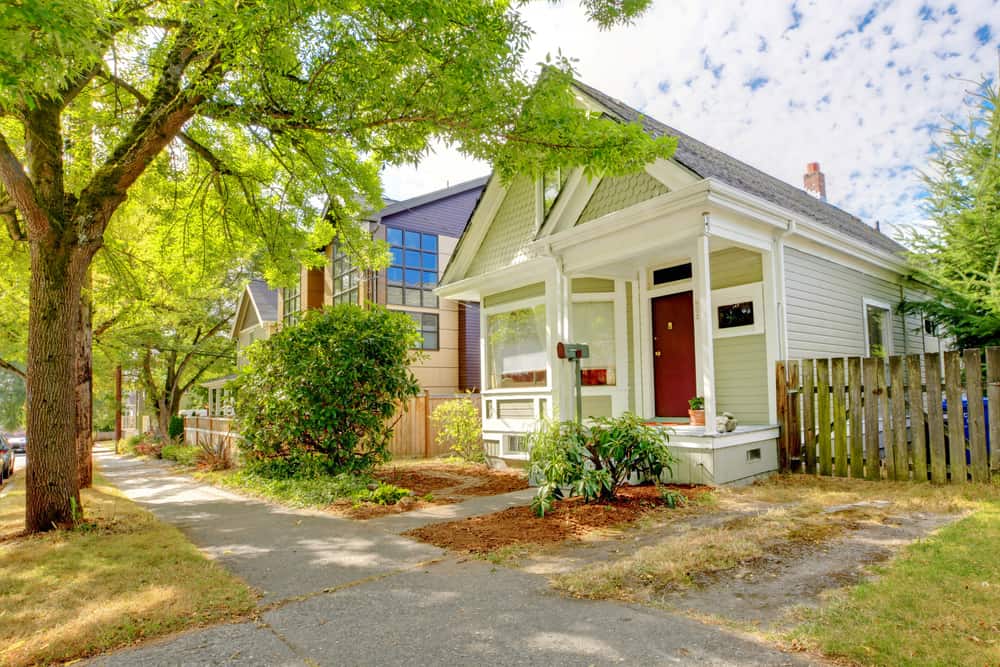For first-time homebuyers, the whole homebuying process may look a bit daunting. You’re going into what could be the biggest purchase of your life with no experience to fall back on. The good news is a little preparation can go a long way and help you approach this major decision with confidence.

Photo: Deposit Photos
Tips for buying first house
Here are 12 tips for buying your first house.
1. Make sure you’re ready to buy, both emotionally and financially.
If you expect to relocate in a few years, this may not be the right time for you to buy a home. If you don’t have cash for a down payment, closing costs and other expenses, you may be better off waiting. Look at your life, your career, your finances and your future expectations, and determine whether buying a house is the right move at this time.
2. Find the right real estate agent.
The difference between deals that close and deals that don’t are the professionals involved. If you’re a buyer, there is no reason not to use a real estate agent. It costs you little or nothing, and the agent’s job goes far beyond finding the house.
Your choice of agent partly depends on where you want to live, because a neighborhood expert often can find you the best house at the best price. “You want people who have worked and have experience directly in the areas you’re looking in,” said Mia Simon, a Redfin agent in Palo Alto, California. You also want a real estate agent who will move quickly when a new listing goes on the market.
However, it’s after you’ve found the house that you’ll most need the agent, both to structure and present the offer and then to troubleshoot issues that arise between contract and closing. A good agent will advise you honestly and help you craft an offer that will be accepted.
3. Get your finances in order first.
Some real estate agents won’t even show homes to prospective clients who don’t have a mortgage preapproval. You definitely should meet with a mortgage broker or banker (better yet, several) at the start of the process to find out how much house you can afford and how much cash you’ll need to close. Do all the math. Just because a bank says you can borrow $200,000 doesn’t mean you should. If you have credit issues, realize that this part of the process could take several months.
4. Calculate each and every cost.
When trying to figure out how much home you can afford, the purchase price and the mortgage payment are just the beginning. Don’t forget homeowner or condo fees, homeowners insurance and real estate taxes. Plus, you’ll need to budget for utilities, repairs and maintenance. Come to terms with the fact that you might not be able to afford the size of house you thought you could when considering home price alone.
5. Don’t spend all your cash.
Avoid emptying your bank account for your down payment and closing costs. There will always be unexpected repairs. Plus, it costs money to move, change locks, put down utility deposits and buy things you never needed before, like a lawn mower. You don’t want to put your financial well-being at risk to purchase your dream home. Remember, your first house does not need to be your forever home. You can always upgrade when your financial situation improves.
6. Choose your location first.
While you may be happy living in any of several neighborhoods in your city, you won’t be happy if you choose the wrong location. And that’s where your research should start: deciding exactly where you want to live. Talk to friends and co-workers, drive around town, visit restaurants and stores and talk to neighbors in areas you’d consider calling home. Go to open houses so you can view some houses — just to determine if that neighborhood is right for you. Look at homes on the Internet, evaluating style, size, price and how long they stay on the market.
7. When you look at houses, focus on the right things.
Once you’re house hunting for real, you need to be smart about how you approach an open house or tour a home for sale. Don’t be distracted by the owner’s odd décor, paint colors, dirty carpet or anything that is easy to change. Granite countertops and stainless steel appliances are easy to add later. Focus instead on the things you can’t change. For example, you can’t easily add another bedroom, a better location or a more functional floor plan.
Even for “easy” updates, you want to evaluate how much work a home will need. If it’s more fixer-upper than move-in ready, consider whether you have the cash to make the changes right away. If not, you must be willing to live in a home with outdated bathrooms, a lack of kitchen storage and 1950s decor until you save enough money for a remodel. These are the more important things to consider when viewing a home for sale.

Photo: Chalo Garcia/Unsplash
8. If you’re buying in a condo or homeowners association, know the rules.
How your association is run can make a big difference in how much you enjoy life in a development. You’ll want to know about all rules and restrictions, from pet ownership to parking restrictions and who can use the pool. Condo buyers also want to investigate the association’s finances, because a poorly run association can mean big assessments later.
9. Visit your favorite neighborhoods at different times and talk to the neighbors.
Most neighborhoods are quiet in the middle of the day. As Glen Craig writes at the personal finance blog “Free From Broke”: “You need to see what the area is like on a Saturday night. Are there kids and such all out driving with music blasting? What’s it like in rush hour in the morning or in the evening?”
10. Consider which contingencies you’re willing to waive.
In the ideal scenario, a purchase offer is contingent on a satisfactory home inspection, approval of your mortgage and an appraisal that equals the purchase price. In most parts of the country, a buyer is smart to keep all those contingencies in the contract. But in a competitive market, you may be competing against buyers who have agreed to waive contingencies. “You never want to [agree to waive them] unless you’re sure you’re 99% safe to do it,” Simon said.

Photo: Deposit Photos
11. Be ready to move quickly once you find the home you want.
Good homes that are well-priced nearly always sell quickly. It’s OK to take some time to think before you make an offer, but you might not want to wait a few weeks. Your agent can provide invaluable advice here.
12. Know what’s important to you.
If you’re on a first-time buyer’s budget, you have to be realistic about what you can afford. No house will be perfect, so where are you willing to compromise? You might have to choose between a smaller house in a specific school district or close to work, or a larger house with a longer commute in a new neighborhood. If you want to be near the water, you might need to consider a condo in order to stay within your budget. You may have to decide if you’d rather have a two-car garage or a perfectly sized backyard.
“If you find 85% of what you’re looking for, you’re doing pretty good,” said Kristi Ferrara, a broker with Better Homes & Gardens Kansas City Homes in Missouri. “If [home buyers are] prepared for that when they hit the street, it makes it easier.”
More quick tips on buying a house
Don’t stress
I know – this seems like a weird one to add – but I think it’s one of the biggest tips for moving into your first house. It will happen – you’ll find a home. Just don’t stress about it – and don’t force it.
It’s still a sellers market
Right now, prices are still high. Buying high can be a strain, so be careful and don’t rush the process. Watch the interest rates carefully to make sure that you’re getting the best bang for your buck!
A version of this story appeared previously at U.S. News & World Report.
If you liked this article, you might also like:

The tip about not taking out a loan for X amount just because the bank says you can is HUGE. My husband and I purchased our first home in 1993. The bank said we could “afford” a $130k home. We purchased a $64k home and paid it off in 5 years. Then we moved out of state and sold that house for $105k after 12 years, but had only paid $15k in interest. We used that equity to purchase a $180k house and paid it off in 5 years again, with little interest. We moved out of state 4 years later and purchased a home for $264k, which was paid off in less than 3 years. This is hopefully our last home. So now, in our mid-40s, we are completely debt free (with years of it between moves in our late 20s-40s).
Not only could we pay off the mortgages and save a TON of interest ($$$) that way, but we also now have the funds we need to send our child to college, debt free.
One thing we did with that first home purchase was to get one we could afford on only one salary (the lowest of our two). That way if something happened to either of us (I ended up with cancer…thankfully during a debt-free period) and we couldn’t work, we could still afford it.
Had we purchased a “two-income” home, I would not have been able to stop my career in order to stay home with our children.
We got 30-year mortgages but paid a 15-year payment at a minimum – usually way more than that. So if something did happen, we could easily afford a low minimum payment (usually around $425) but in good months it was more like $2000/month payments.
Also, you don’t need a house as nice as your parents – it took them a long time to get there!!! ;-)